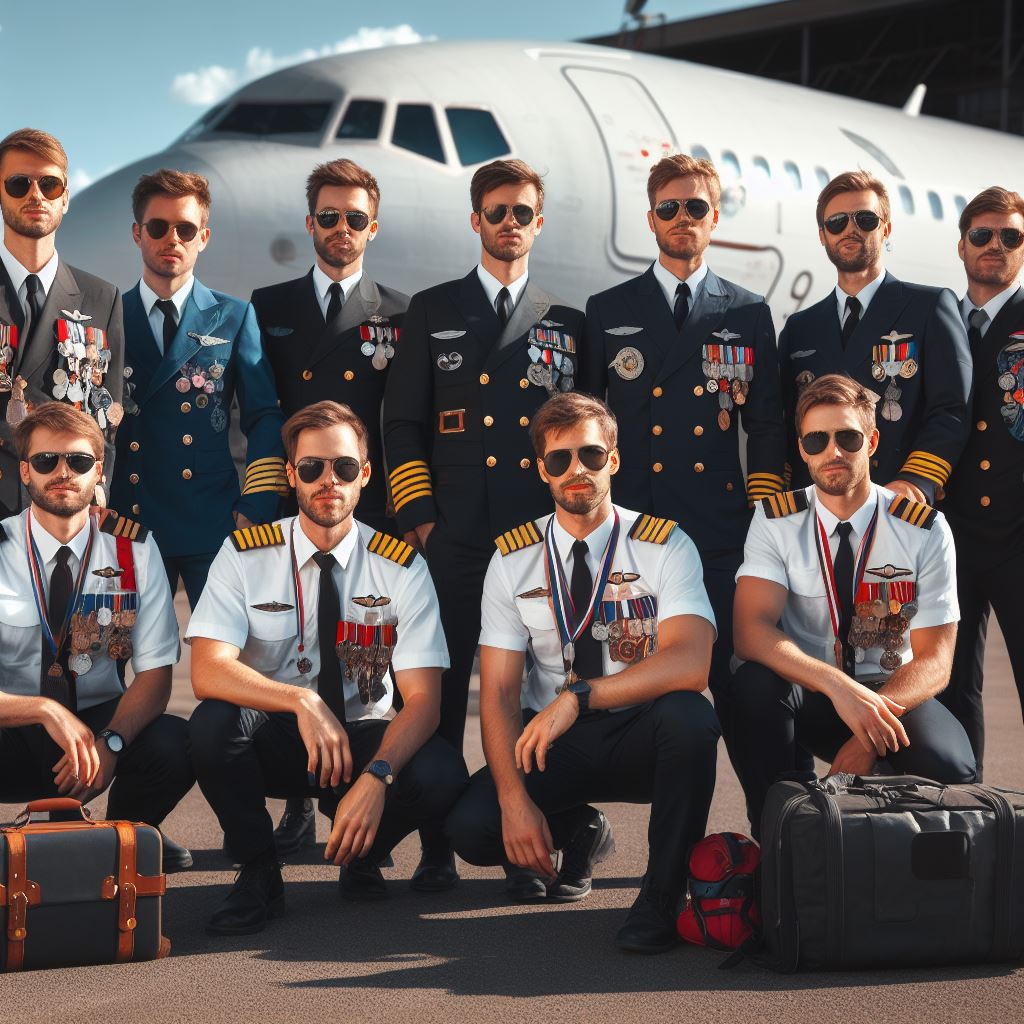Introduction
Every pilot needs to possess a set of essential skills in order to succeed in their career.
These skills go beyond just flying an aircraft and play a crucial role in ensuring the safety and efficiency of every flight.
The importance of essential skills for pilots
Pilots are responsible for the lives of their passengers, the smooth operation of the aircraft, and the overall success of the flight.
Without the necessary skills, pilots would not be able to handle emergencies, make critical decisions, or communicate effectively.
Overview of the upcoming points
In this section, we will discuss the essential skills that are imperative for pilots to possess.
These skills include aeronautical knowledge, situational awareness, problem-solving abilities, effective communication, and decision-making skills.
Each of these skills is vital for a pilot’s success and will be explored in detail.
Aeronautical knowledge is the foundation of piloting and involves understanding aircraft systems, navigation, weather, regulations, and procedures.
Situational awareness refers to a pilot’s ability to perceive and comprehend the current situation.
It involves constantly monitoring surroundings, staying updated on flight conditions, and anticipating potential risks.
Problem-solving abilities are crucial for pilots to address unexpected challenges, troubleshoot technical issues, and make quick and effective decisions.
Effective communication is essential for pilots to convey information with other crew members, air traffic controllers, and passengers.
Clear and concise communication ensures a smooth operation and enhances safety.
Decision-making skills are paramount in critical situations when pilots must analyze options, assess risks, and choose the best course of action.
In essence, the possession of essential skills is vital for every pilot’s success.
These skills enable pilots to handle emergencies, make informed decisions, maintain situational awareness, and effectively communicate with others throughout every flight.
Technical Skills
Flight operations knowledge
Technical skills form the foundation of a successful pilot’s career.
Flight operations knowledge is the cornerstone that enables a pilot to operate within the established guidelines and regulations.
Without this knowledge, pilots would struggle to make informed decisions and demonstrate safe flying practices.
Knowledge of navigation and communication procedures
In addition to flight operations knowledge, an understanding of aircraft systems is crucial.
Transform Your Career Today
Unlock a personalized career strategy that drives real results. Get tailored advice and a roadmap designed just for you.
Start NowPilots must know how the aircraft’s mechanical and electrical systems function, as well as how to troubleshoot any potential issues that may arise during a flight.
This knowledge ensures that pilots can respond appropriately to any system failures or abnormalities, minimizing risks and ensuring the safety of the aircraft and its occupants.
Furthermore, pilots need to have a solid grasp of navigation and communication procedures.
This includes understanding how to read aviation charts, plan routes, and communicate effectively with air traffic control.
By adhering to proper navigation and communication protocols, pilots can ensure smooth and efficient flights while avoiding potential conflicts with other aircraft.
Competence in interpreting flight instruments
Instrumentation proficiency is another critical technical skill. Pilots need to be able to interpret flight instruments accurately in order to monitor the aircraft’s performance and flying conditions.
This includes understanding instrument readings, such as airspeed, altitude, and heading, and being able to make informed decisions based on this data.
In adverse weather conditions, where visual references may be limited, relying on instruments becomes even more crucial to maintain situational awareness and fly safely.
Maneuvering and handling skills
Maneuvering and handling skills are also essential for pilots to effectively operate an aircraft.
This includes the ability to perform various flight maneuvers, such as climbs, descents, turns, and stalls, safely and accurately.
These skills allow pilots to handle different flight situations and emergencies, ensuring the safety and well-being of everyone on board.
Skillful control in different aircraft phases (takeoff, landing, etc.)
Finally, skillful control in different aircraft phases, such as takeoff and landing, is essential for pilots.
These critical stages of a flight require precise control and coordinated actions to ensure a smooth and safe operation.
By mastering these skills, pilots can confidently handle any challenges that arise during these crucial phases of flight.
In general, technical skills are paramount for a pilot’s success.
Flight operations knowledge, understanding of aircraft systems, proficiency in navigation and communication procedures, instrumentation proficiency, maneuvering and handling skills, and skillful control in different aircraft phases are all essential for pilots to excel in their careers.
Developing and honing these skills not only ensures safe and efficient flights but also inspires confidence in both the pilot and those flying with them.
Read: Facing Challenges: Mental Health in the Trucking Industry
Decision-making Skills
Having strong decision-making skills is crucial for any pilot to succeed in their career.
Showcase Your Business Today
Reach thousands of readers actively exploring professional services. Publish your business profile and grow your audience now.
Publish NowHere are some essential aspects of decision-making skills that every pilot should possess:
Situational awareness
One fundamental skill that every pilot needs to have is situational awareness.
This involves being constantly aware of their surroundings and potential hazards that may arise during the flight. By paying attention to their environment, pilots can make informed decisions.
Risk assessment and management
Another critical skill for pilots is the ability to assess and manage risks.
Identifying potential risks and evaluating their severity is essential for ensuring a safe flight. Pilots must be proactive in implementing strategies to mitigate these risks effectively.
Judgment and problem-solving
Pilots often find themselves in high-pressure situations where they need to make quick and sound decisions.
Having good judgment is crucial for making the right choices when faced with unexpected challenges during the flight.
Moreover, pilots must be skilled problem solvers, finding effective solutions on the spot.
How to Improve Decision-making Skills
Now that we understand the importance of decision-making skills for pilots, let’s explore some ways to improve these skills:
Continuous training and education
Pilots should never stop learning. Engaging in continuous training and education programs helps them stay updated with the latest advancements in aviation and decision-making techniques.
This ongoing learning process enhances their skills and keeps them prepared for any situation.
Simulation exercises
Simulations provide pilots with a safe environment to practice decision-making skills.
These exercises mimic real-life scenarios, allowing pilots to develop and refine their abilities without any real-life consequences.
Simulations help build confidence and enhance decision-making capabilities under various conditions.
Seeking mentorship and feedback
Seasoned pilots can provide valuable insights and guidance for developing decision-making skills.
Seeking mentorship allows less experienced pilots to learn from the experiences of their mentors.
Additionally, actively seeking feedback from instructors and peers helps pilots identify areas for improvement and refine their decision-making process.
Analyzing past experiences
Reviewing past flights and analyzing the decisions made during those flights can provide valuable lessons.
By reflecting on what worked well and what could have been done differently, pilots can enhance their decision-making skills.
Learning from past experiences helps pilots make better choices in the future.
The Impact of Decision-making Skills
The ability to make informed decisions and solve problems effectively has a significant impact on a pilot’s career. Here are some key benefits of strong decision-making skills:
Enhanced safety
By having good decision-making skills, pilots can mitigate risks and navigate challenging situations safely.
This ensures the safety of the passengers, crew, and aircraft, leading to fewer accidents and incidents.
Efficient operations
Sound decisions and effective problem-solving lead to smoother operations.
Pilots with strong decision-making skills can handle unexpected events efficiently, minimizing disruptions and delays.
Career advancement opportunities
Pilots who demonstrate excellent decision-making skills are often recognized and rewarded.
Airlines and aviation companies value individuals who can make quick and accurate decisions, which can lead to career advancement opportunities and higher positions within the industry.
Passenger trust and confidence
Passengers place their trust in pilots to transport them safely to their destination.
By demonstrating strong decision-making skills, pilots instill confidence and trust in their abilities, improving the overall passenger experience.
Decision-making skills are essential for every pilot to succeed in their career.
Being aware of surroundings, assessing and managing risks, using judgment and problem-solving abilities are crucial aspects of these skills.
Pilots should continuously strive to improve their decision-making abilities through training, simulations, mentorship, and learning from past experiences.
Strong decision-making skills have a significant impact on safety, efficiency, and career prospects within the aviation industry.
Read: Women in Trucking: Breaking Barriers in a Male-Dominated Field

Communication Skills
Effective communication is a crucial skill for every pilot to succeed in their career.
Pilots must be able to communicate clearly and accurately with air traffic controllers, other crew members, and ground staff.
Here are some essential aspects of communication skills that every pilot should possess:
Clear and Effective Communication
In aviation, clear and effective communication is of utmost importance. Pilots need to convey information in a concise and understandable manner.
They must articulate their intentions and instructions clearly to ensure the safety of all on board.
Communicating with Air Traffic Controllers and Crew Members
Pilots need to establish effective communication with air traffic controllers to ensure smooth and safe operations.
Showcase Your Business Today
Reach thousands of readers actively exploring professional services. Publish your business profile and grow your audience now.
Publish NowThey should follow radio communication protocols, acknowledge instructions promptly, and report any issues or deviations.
Additionally, pilots must communicate effectively with other crew members to maintain coordination throughout the flight.
Transmitting Information Accurately and Concisely
A pilot’s ability to transmit information accurately and concisely is crucial for effective communication.
They must relay important flight details, such as altitude changes, weather updates, and navigation instructions, with utmost precision.
This ensures that all stakeholders have the correct information to make informed decisions.
Teamwork and Collaboration
Pilots should possess excellent teamwork and collaboration skills as they work closely with co-pilots, flight attendants, and ground staff.
collaboration enhances the overall efficiency and safety of flight operations.
Working Closely with Co-Pilots, Flight Attendants, and Ground Staff
Pilots must establish a strong working relationship with their co-pilots, flight attendants, and ground staff.
They should communicate openly and coordinate seamlessly during pre-flight preparations, inflight operations, and post-flight procedures.
This teamwork ensures a smooth and efficient flight experience for all.
Cooperation During Emergencies and Routine Operations
In both emergency situations and routine operations, pilots must demonstrate effective communication and cooperation.
They need to quickly and accurately relay information to all crew members, working together to handle any emergencies and ensure the safety of passengers and the aircraft.
Generally, communication skills are indispensable for pilots to succeed in their profession.
They must have a clear and effective communication style, be adept at interacting with air traffic controllers and crew members, transmit information accurately and concisely, demonstrate teamwork and collaboration, and cooperate during emergencies and routine operations.
These skills enable pilots to navigate the challenges of aviation and maintain a high level of safety in every flight.
Read: The Environmental Impact of Trucking in the US
You Might Also Like: Challenges Faced by Logisticians in the U.S. & How to Overcome
Emotional Intelligence
Throughout a pilot’s career, emotional intelligence is crucial for building strong relationships with team members and passengers.
Understanding one’s own emotions and empathizing with others allows for effective communication and collaboration in various situations.
Stress Management
Stress management is also essential for pilots who often work in high-stakes environments.
They must develop strategies to cope with stress and pressure, including setting realistic goals, taking breaks, and practicing self-care.
By prioritizing mental well-being, pilots can maintain focus and composure during challenging situations.
Coping with Stress and Pressure in a High-Stakes Environment
Coping with stress and pressure in a high-stakes environment requires various techniques. Pilots can use relaxation techniques such as deep breathing and visualization to stay calm.
Seeking support from colleagues and mentors helps create a network to share experiences and find solutions.
Additionally, adopting a positive mindset and reframing challenges as opportunities for growth can help pilots navigate demanding situations.
Resilience
Resilience is vital for pilots to bounce back from setbacks and failures.
By analyzing failures, learning from experiences, and maintaining a positive attitude, pilots can continuously improve their skills.
Embracing constructive criticism and utilizing problem-solving abilities also contribute to resilience in the face of adversity.
Persisting in the Face of Adversity
Persistence is another important skill for pilots.
They must set clear goals and stay motivated despite obstacles and setbacks.
Building a support network of mentors, peers, and loved ones provides encouragement throughout the journey.
Pilots should also take calculated risks and continuously seek opportunities for self-improvement to enhance their performance.
Basically, emotional intelligence, stress management, coping with stress and pressure, resilience, bouncing back from setbacks and failures, as well as persistence, are essential skills that every successful pilot needs.
By actively developing and honing these skills, pilots can navigate their career with confidence and effectiveness.
Read: Stories from the Road: Interviews with Veteran Truckers
Conclusion
Recapping the essential skills discussed, pilots need excellent communication, decision-making, and problem-solving abilities.
Furthermore, situational awareness, leadership, and adaptability are crucial for their success.
Continuous development and refinement of these skills are necessary as aviation technology and challenges evolve.
Pilots must consistently strive to enhance their proficiency in these areas to ensure safe and efficient flights.
Ultimately, the significance of these skills cannot be overstated in the pursuit of pilot success.
Showcase Your Business Today
Reach thousands of readers actively exploring professional services. Publish your business profile and grow your audience now.
Publish NowThey determine the effectiveness of their actions, interactions with crew and passengers, and the outcomes of flights.
Without these essential skills, pilots would struggle to handle emergencies, make sound decisions, and maintain professionalism.
Hence, continuously honing these skills leads to improved safety, performance, and overall success in the aviation industry.
By recognizing the importance of these skills and actively working on their development, pilots can achieve remarkable success in their careers.
[E-Books for Sale]
The Big Book of 500 High-Paying Jobs in America: Unlock Your Earning Potential
$19.99 • 500 High-Paying Jobs • 330 pages
Explore 500 high-paying jobs in America and learn how to boost your career, earn more, and achieve success!
See All 500 High-Paying Jobs of this E-Book
1001 Professions Without a Degree: High-Paying American Jobs You Can Start Now
$19.99 • 1001 Professions Without a Degree • 174 pages
Discover 1001 high-paying jobs without a degree! Unlock career tips, skills, and success strategies for just $19.99!




